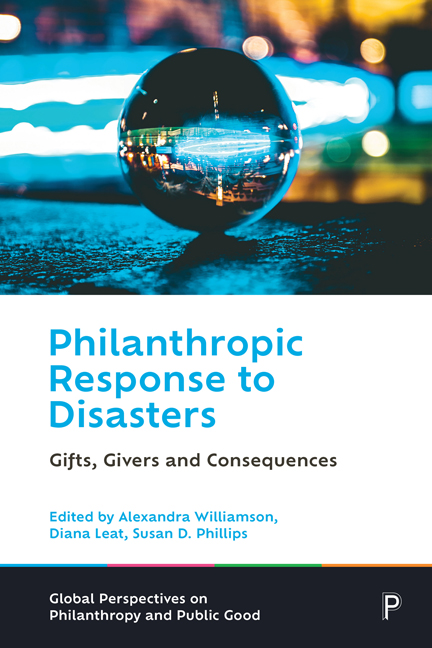Book contents
- Frontmatter
- Contents
- List of tables and figures
- Notes on contributors
- Series editors’ preface
- 1 Introduction
- 2 The public’s philanthropic response to disaster: plus ça change?
- 3 Disaster fundraising: readiness matters
- 4 Roles of philanthropic foundations as funders and distribution agents in disaster response
- 5 The private sector and disasters: from reactive response to disaster resilience
- 6 Fundraising, grantmaking and regulatory issues: regulating good in bad times
- 7 Doing good better: public policy for disaster philanthropy
- 8 Philanthropy’s place in community-based capacity development for disaster resilience
- 9 Nonprofit collaboration and coordination in disaster response: lessons from the 11 September recovery
- 10 The promise and reality of philanthropy in disasters
- 11 Conclusions and looking forward
- Index
1 - Introduction
Published online by Cambridge University Press: 17 January 2024
- Frontmatter
- Contents
- List of tables and figures
- Notes on contributors
- Series editors’ preface
- 1 Introduction
- 2 The public’s philanthropic response to disaster: plus ça change?
- 3 Disaster fundraising: readiness matters
- 4 Roles of philanthropic foundations as funders and distribution agents in disaster response
- 5 The private sector and disasters: from reactive response to disaster resilience
- 6 Fundraising, grantmaking and regulatory issues: regulating good in bad times
- 7 Doing good better: public policy for disaster philanthropy
- 8 Philanthropy’s place in community-based capacity development for disaster resilience
- 9 Nonprofit collaboration and coordination in disaster response: lessons from the 11 September recovery
- 10 The promise and reality of philanthropy in disasters
- 11 Conclusions and looking forward
- Index
Summary
When disasters strike, people's lives are upended. Alongside the horror, grief and often fear, there is a strong compulsion to act, to attempt to make things better. This very human response is enacted at the individual level, but also at the level of groups, organisations, communities and major institutions in our societies. Money is most often given, although donations of time and goods are also common. With the increased frequency and severity of climate-related disasters and potential for future global pandemics, philanthropy will be called upon more frequently to alleviate the effects in the short term and help build more resilient communities over the longer term. While research and professional practice in disaster management is well developed, our knowledge of the ways in which philanthropic responses to disasters are motivated, organised and received is fragmented. This has resulted in a lack of cumulative learning for professional practice and public policy for philanthropy in the context of disasters and, at worst, inefficient and ineffective use of philanthropic resources. This book is a step toward curating our existing knowledge in the emerging field of ‘disaster philanthropy’ research and building a robust base for future research, practice and public policy.
This introduction lays the foundation for the chapters that follow by first defining and unpacking the seemingly simple notions of ‘disaster’ and ‘philanthropy’. In general, philanthropy is the intentional use of private resources for public purposes. Within this very broad definition there are important distinctions which we discuss below. ‘Disaster philanthropy’ refers to the mobilisation and use of resources provided by sources other than governments to respond to, recover from, prepare for or prevent any kind of disaster. The issues and challenges in philanthropic responses to disasters are different from those encountered in ‘everyday’ philanthropic activity. In disaster philanthropy, many things are heightened: greater need, urgency and stress; lack of reliable information; imperatives for collaboration; more media and public scrutiny; challenges of distributing massive amounts of donations, often in distant locales; and heightened potential for fraud, among others.
Philanthropic responses to different disasters are notoriously uneven, across and within countries. As one example, in 2017 the American Red Cross raised 40 times more ($350 million versus $9 million) for the response to Hurricane Harvey that affected Texas and Louisiana than was raised for the equally devastating Hurricane Maria that struck Puerto Rico that year (Yordán, 2021).
- Type
- Chapter
- Information
- Philanthropic Response to DisastersGifts, Givers and Consequences, pp. 1 - 25Publisher: Bristol University PressPrint publication year: 2023



